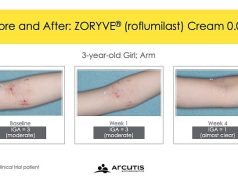No increased risk seen with topical calcineurin versus topical corticosteroids in adults with dermatitis
THURSDAY, Aug. 27, 2020 (HealthDay News) — There is no association between use of topical calcineurin inhibitors (TCIs) for the treatment of atopic dermatitis (AD) and an increased risk for skin cancer, according to a study published online Aug. 12 in JAMA Dermatology.
Maryam M. Asgari, M.D., M.P.H., from the Massachusetts General Hospital in Boston, and colleagues used data from Kaiser Permanente Northern California to identify 93,746 adults (≥40 years) with a physician-rendered diagnosis of AD or dermatitis (diagnosed from 2002 through 2013 with follow-up through 2017). The risk for keratinocyte carcinoma (KC) was compared among adults exposed to TCIs versus those exposed to topical corticosteroids and those unexposed to TCIs or topical corticosteroids.
The researchers observed no association between TCI exposure and KC risk (adjusted hazard ratio [aHR], 1.02; 95 percent confidence interval [CI], 0.93 to 1.13) versus topical corticosteroid exposure. There were no significant differences noted in basal cell carcinoma (BCC) risk (aHR, 1.01 [95 percent CI, 0.90 to 1.14] for TCI versus topical corticosteroids) or squamous cell carcinoma (SCC) risk (aHR, 0.94 [95 percent CI, 0.82 to 1.08] for TCI versus topical corticosteroids). Findings were similar when comparing individuals with TCI exposure to unexposed individuals (aHR, 1.04 [95 percent CI, 0.91 to 1.19] for BCC). The investigators observed no associations between TCI dose, frequency, and duration of use and BCC, SCC, or overall KC risk.
“The findings of this study suggest that use of topical calcineurin inhibitors may not increase the risk of keratinocyte carcinoma risk among adults with atopic dermatitis,” the authors write.
Asgari disclosed financial ties to Valeant Pharmaceuticals and Pfizer.
Copyright © 2020 HealthDay. All rights reserved.








